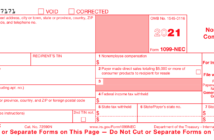Summary
- All rental expenses are either deducted immediately or capitalized over time.
- The IRS has mostly cleared up where the dividing line is between these.
- What forms to need to file to claim higher dollar expenses immediately.
When you own a vacation rental property that is used for business purposes, you can deduct all the expenses against your income. How this occurs depends on what the expenses are and how large they are. Fortunately, the IRS has recently cleared up much of the confusion of how this should work.
If you are new to renting real estate, there are two ways to account for your expenses on your tax return. First, incidental items and items with a short life can be immediately deducted against your income in the tax year when they occur. Second, for capital improvements expenses, which are major changes to the property that have long life, these are “capitalized”, which means that you take a deduction in the tax year for a portion of the expense that is determined by a formula specific to the type of capital expense. The formula approximates the expected life span of the improvement and a deduction is calculated for each year of the expected lifespan.
IRS Rules
In the past 5 years, the Internal Revenue Service (IRS) has clarified for property owners exactly how your expenses should be either deducted or capitalized. It all started in 2013 with the issuance of the Treasury Directive 9636. In a follow-up, the IRS created what is called the Safe Harbor Exception for Small Taxpayers, which exempts some home improvements from the requirement that these capital expenses be amortized over their life.
Some of this is pretty cut and dry. When you first purchase your property, you would capitalize the cost of the structures/buildings in the year you bought it (exclude the assessment of the value of the land). After you own the property, you might then make other major repairs and improvements, each of which would then be capitalized.
Where The Confusion Lies
If you think about it, there is a large gray area as to what might qualify as a capital expense versus one that is perhaps related to maintenance or repair. If you spend $50K to improve your house with an addition, it is easy to see that is a major capital improvement that would be capitalized. Later on, if you buy a $500 dishwasher, should that be capitalized? What the IRS has indicated is that under most circumstances, the answer is no, the dishwasher would be expense-d immediately. The important detail is the dishwasher was not bought as part of a much larger home improvement project.
The Specific Rules
The IRS has specified how to draw the line on where to put expenses based upon a set of rules. Generally, for small repairs and improvements you don’t need to go to the trouble of capitalizing these costs.
Here is a summary of the requirements to claim improvement and repair expenses immediately, using the IRS guidelines.
- Average annual gross receipts of $10 million or less; and
- Owns or leases building property with an unadjusted basis of less than $1 million or less; and
- The total amount paid during the taxable year for repairs, maintenance, improvements, or similar activities performed on such building property doesn’t exceed the lesser of-
–> Two percent of the unadjusted basis of the eligible building property; or
–> $10,000
How To Apply The Rules
Let’s go through this one by one. In the first bullet, gross receipts refer to the annual income for the property. If you own real estate to rent to guests only, it is very unlikely you would exceed this threshold (this might come into play of you have other business activities associated with the property or if it is a large property) .
In the second one, your purchase price when you bought the vacation property needs to be less than $1 million. Most property owners fall into this category, though, $1 million for many vacation properties isn’t actually that uncommon these days. The term “unadjusted” means the original cost basis. For example, if you bought a bungalow for $500K, then spent $600K to rebuild, your cost basis is $1.1M. However, for this requirement, the $500K number applies.
In the final requirement, your total expenses need to be less than $10K or 2% of the basis you calculated in previously. Going back to that $500K property, 2% is exactly $10K. Here are some examples to further your understanding.
Examples
Question #1:
Sally bought a vacation property for $500,000 that earns $50,000 a year in rental income. She decided to buy new windows ($2000), a new dishwasher ($500) and replace her deck ($3000). Do these expenses need to be capitalized or does she qualify for the Safe Harbor Exception?
Answer #1:
The total of her improvement expenses is $5,500. This is less than $10K, which is 2% of the un-adjusted basis for her property. She qualifies for the exception.
Question #2:
Sandeep bought a vacation property for $700,000 that earns $60,000 a year in rental income. He decided to buy new water heater ($1500) and replace his roof ($5000). He also put a garage addition on the house for $15,000. Do these expenses need to be capitalized or does he qualify for the Safe Harbor Exception?
Answer #2:
The total of his improvement expenses is $21,500, so no exception can be used. This is more than $10K, which is the limit given that 2% of the original basis is $14K. When considering the Safe Harbor Exception, you must consider the total improvements for the entire year. There were a few smaller improvement expenses but these need to be lumped together and shouldn’t be separated from the major improvement expense.
How To Claim Safe Harbor
In the example above, Sally can claim a Safe Harbor exception. This requires that she tell the IRS that she wants to use the exception. This is pretty straight forward you just need to send a notice on a page that you are claiming the exception and the list of properties it will apply to.
There is no published IRS form for this purpose. It is essentially a marker page that has no actual information except the title.
If you use a standard tax package such as H&R Block Tax Software, they will create a simple page for you. Not only that they will ask you about it during the interview for your rental properties when using the software.



1 Comment
Pingback: Everything You Need to Know About Depreciation - VacationLord